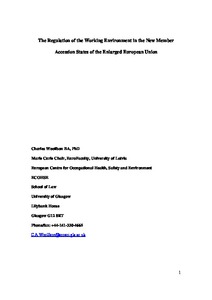The Regulation of the Working Environment in the New Member Accession States of the Enlarged European Union
"Although formal transposition of EU directives is largely complete, support for occupational health and safety regulation is limited among business and political elites in the new member accession states of Central and Eastern Europe. An unacknowledged gap exists between successful legal trans...
| Main Author: | |
|---|---|
| Institution: | ETUI-European Trade Union Institute |
| Format: | TEXT |
| Language: | English |
| Published: |
European Centre for Occupational Health, Safety and Environment
2004
|
| Subjects: | |
| Online Access: | https://www.labourline.org/KENTIKA-19138765124919569479-The-Regulation-of-the-Working-.htm |
| Summary: | "Although formal transposition of EU directives is largely complete, support for occupational health and safety regulation is limited among business and political elites in the new member accession states of Central and Eastern Europe. An unacknowledged gap exists between successful legal transposition, and current evidence of a deteriorated working environment. In addition, weaknesses in workplace social dialogue imply that the European Commission's current emphasis on 'soft law', in particular, the Open Method of Co-ordination relying on 'corporate social responsibility', 'best practice' and self-regulatory 'preventative safety cultures', may be inappropriate in securing safety and health at work in the new member accession states from Central and Eastern Europe. Prospects for the future regulatory regime are, therefore, uncertain." (Author's abstract) |
|---|---|
| Physical Description: | 42 p. Digital |

